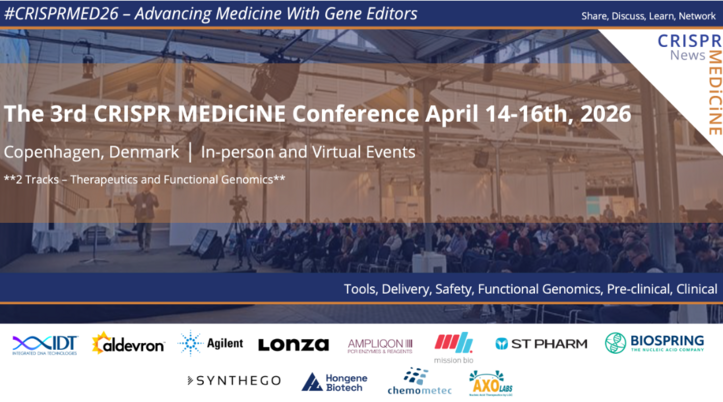CMN Weekly (16 December 2022) - Your Weekly CRISPR Medicine News
By: Karen O'Hanlon Cohrt - Dec. 16, 2022
Top picks
- The top news this week comes from Great Ormond Street Hospital (GOSH) in the UK, which released groundbreaking results from its first-in-human clinical trial using base-edited CAR-T cells. In May 2022, 13-year old Alyssa from Leicester in the UK became the first reported patient in the world to receive base-edited T-cells at GOSH, in collaboration with the University College London Great Ormond Street Institute of Child Health. Facing the prospect of palliative care at the time, Alyssa received the experimental treatment for incurable T-cell acute lymphoblastic leukaemia, having exhausted all conventional treatments for the disease. She received a treatment containing healthy donor-derived base-edited CAR T-cells engineered to boost her immune system to attack the cancer. Within 28 days of her treatment she was in remission, and continues to do well at home with regular follow ups at GOSH.
Research
- Researchers in Italy and the U.S. have found that human genetic diversity alters off-target outcomes of therapeutic gene editing. In an article published yesterday in Nature Genetics, the team describes a new tool called CRISPRme that considers single-nucleotide polymorphism (SNP) and indel genetic variants to nominate and prioritise off-target sites. This approach differs to standard computational and biochemical methods used to predict off-target potential, which focus on reference genomes only. The findings illustrates how genetic variants should be considered as modifiers of gene-editing outcomes.
- In an article published in Nature Communications yesterday, scientists in the U.S. describe how they repurposed the type III-A CRISPR complex from Thermus thermophilus (TtCsm) for programmable capture and concentration of specific RNAs from complex mixtures. In the assay setup, the target bound-TtCsm complex generates two cyclic oligoadenylates (cA3 and cA4) that allosterically activate ancillary nucleases Can1 and Can2. The team showed that these nucleases cleave single-stranded RNA, single-stranded DNA, and double-stranded DNA in the presence of cA4. The assay was applied to directly detect SARS-CoV-2 RNA in nasopharyngeal swabs with 15 fM sensitivity.
- Scientists at Metagenomi report in an article published in Nature Communications yesterday the discovery of compact Cas9d and HEARO enzymes for genome editing from uncultivated microbes. They demonstrate that natural Cas9d enzymes can be used to perform genome editing in mammalian cells with >90% efficiency, and they also engineered nickase variants into the smallest base editors active in E. coli and human cells. The authors propose that Cas9d and HEARO systems will enable a variety of genome-editing applications, owing to their small size, broad targeting potential, and translatability.
- A team in the U.S., including scientists at Allogene Therapeutics, has reported a case in Molecular Therapy in which a chromosome 14 inversion was found in a patient who developed bone marrow aplasia following treatment with allogeneic chimeric antigen receptor (CAR) T cells containing gene edits made with transcription activator-like effector nucleases (TALEN®). TALEN editing sites were not involved at either breakpoint. After thorough analysis, the authors conclude that the event was spontaneous and possibly mediated by the recombination-activating gene (RAG) gene. The findings highlight the need to rule out off-target gene-editing sites, and illustrate that other processes such as spontaneous V(D)J recombination can lead to chromosomal alterations in infused cells independent of gene editing.
Clinical
- CRISPR Therapeutics provided an update on the ongoing Phase 1 CARBON™ Trial of CTX110 this week at the 64th American Society of Hematology (ASH) Annual Meeting. CTX110 is a CRISPR-Cas9-edited allogeneic CAR T-cell therapeutic candidate targeting CD19+ B-cell malignancies. The latest data from the two-part trial revealed potential for CTX110 to achieve long-term durable complete remissions (CR) with a positively differentiated safety profile in heavily pre-treated patients, as well as an emerging encouraging efficacy profile with several patients in ongoing CR beyond six months. Read our previous coverage on CTX110 here.
- Fate Therapeutics announced clinical safety and activity data for the first iPSC-derived CAR T-cell therapy at this year's ASH Annual Meeting. The data refers to the ongoing Phase 1 study of FT819 in patients with relapsed or refractory B-cell lymphoma. This trial is the first-ever clinical investigation of a T-cell candidate manufactured from a clonal master iPSC line, a renewable cell source that enables large-scale manufacture of engineered T-cell therapies. FT819 contains several first-of-kind features including the integration of a novel CD19-targeted 1XX chimeric antigen receptor (CAR) construct into the T-cell receptor alpha constant (TRAC) locus, which is intended to promote uniform CAR expression, enhance T-cell potency, and prevent graft-versus-host disease. You can read more about FT819 and Fate Therapeutic's approach to CAR-T threapy development here.
- Cellectis announced positive preliminary clinical data for UCART22 in relapsed or refractory acute lymphoblastic leukaemia (r/r ALL) and UCART123 in relapsed or refractory acute myeloid leukemia (r/r AML) at the annual ASH meeting held this week. UCART22 is a TALEN-engineered CD22-targeting cell therapeutic being evaluated in the Phase 1/2a BALLI-01 clinical trial, while UCART123 is TALEN-engineered to target CD123, an antigen expressed at the surface of leukaemic cells in AML.
Industry
- New York-headquartered Seelos Therapeutics announced in vivo data yesterday data demonstrating that a single dose of its epigenome-modulating candidate SLS-004 downregulated the production of alpha-synuclein (α-synuclein) in an established α-synuclein overexpressing animal model of Parkinson's disease (PD). α-synuclein is heavily linked to the pathophysioloy of PD. SLS-004 is based on a catalytically-dead form of Cas9 (dCas9) designed to modulate the expression of α-synuclein protein through hyper methylation of the SNCA gene.
- Caribou Biosciences has selected the cell-signalling receptor ROR1 as the target for CB-020, an induced pluripotent stem cell (iPSC)-derived allogeneic CAR-natural killer (NK) cell therapy being developed for multiple solid cancer types. ROR1 is overexpressed on the surface of several solid tumour types, and CB-020, which is Caribou's first off-the-shelf iPSC-derived CAR-NK cell therapy, is engineered using the company's Cas12a chRDNA genome-editing technology to express a ROR1-specific CAR, which can enhance the innate NK cell anti-tumor activity.
- Beam Therapeutics presented first in vivo proof of concept pre-clinical data on its multiplex base-edited Engineered Stem Cell Antibody Paired Evasion (ESCAPE) platform for a non-genotoxic conditioning regimen for patients with sickle cell disease (SCD), ahead of autologous transplant. Beam is advancing ESCAPE as part of its long-term strategy to support broad accessibility of base-editing treatments for patients with SCD and other blood diseases.
- Graphite Bio presented pre-clinical data for a novel sequencing method to determine gene-editing outcomes at this year's ASH Annual Meeting. Specifcally, the company presented a single-cell RNA sequencing method to assess gene correction outcomes in patients who have been treated with nulabeglogene autogedtemcel (nula-cel), an investigational gene-edited therapy for sickle cell disease.
Reviews
- CRISPR-Based Diagnostics: Challenges and Potential Solutions toward Point-of-Care Applications. The authors of this review discuss key advances in the field of CRISPR diagnostics, with an emphasis on the challenges of sample processing, stability, multiplexing, amplification-free detection, signal interpretation, and process automation. They also also discuss potential solutions for revolutionising CRISPR-based diagnostics toward sample-to-answer diagnostic solutions for point of care and home use.
- CRISPR: a tool with potential for genomic reprogramming in neurological disorders. In this review article, the mechanisms and limitations CRISPR-Cas9 technology in the context of treating neurological disorders are discussed.
- Recent advancements in nucleic acid detection with microfluidic chip for molecular diagnostics. This review contains a summary of nucleic acid testing workflows, including sample processing and nucleic acid detection. The typical microfluidic chip technologies and new research advances are also summarised, and the main challenges facing microfluidic chip-based nucleic acid detection are discussed.
News from CRISPR Medicine News
- This week's clinical update looked at new 12-month clinical data released by Caribou Biosciences from the ongoing ANTLER Phase 1 trial of CB-010 for relapsed/refractory B cell non-Hodgkin lymphoma. The latest data demonstrates long-term durability following a single infusion of CB-010 at the initial dose level 1 (40x106 CAR-T cells). Read the full update here.
Huh, Heh, Wow
Scientists in the U.S. have developed a new CRISPR-based method that makes trees flower in months instead of years. The team, at UGA Warnell School of Forestry and Natural Resources and Franklin College of Arts and Sciences, used CRISPR to edit a flowering repressor gene in the poplar tree, and this reduced the flowering time from more than seven years to three to four months. This advance should accelerate tree breeding for improved traits, such as cold or drought tolerance. The results were published in New Phytologist.
To get more of the CRISPR Medicine News delivered to your inbox, sign up to the free weekly CMN Newsletter here.
Tags
CLINICAL TRIALS
IND Enabling
Phase I
Phase II
Phase III
Recurrent or Progressive High-grade Glioma, (NCT06737146)
Sponsors:
Suzhou Maximum Bio-tech Co., Ltd.
Sponsors:
Suzhou Maximum Bio-tech Co., Ltd.
IND Enabling
Phase I
Phase II
Phase III
Advanced Peritoneal Malignancies or Abdominal Metastatic Solid Tumors, (NCT06912152)
Sponsors:
Zhejiang University
Sponsors:
Zhejiang University
IND Enabling
Phase I
Phase II
Phase III







